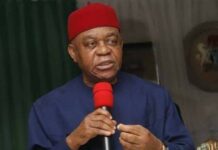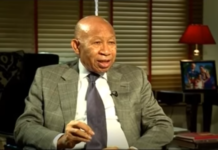Against the backdrop of accusations of selective prosecution and witch-hunting of the leaders of the opposition, the Economic and Financial Crimes Commission (EFCC) has explained that the chieftain of All Progressives Congress (APC) Jafaru Isa, was released because he returned part of the funds he collected from the Office of the former National Security Adviser (ONSA).

EFCC Chairman Ibrahim Magu explained that Jafaru Isa had begun the process of refunding the money in his possession, but that the spokesperson of the Peoples Democratic Party Olisa Metuh refused to do likewise.
Speaking at a meeting with online media publishers in Lagos, the anti-graft boss stated: ”From the records, Metuh got over N400 million; he has not said anything. We need the public’s money to be returned so that it can be used for public good.
“Also Jafaru Isa, what Dasuki gave him was N170 million. He of course collected that money. He was with us for four to five days and then he made a deposit of N100 million and entered an undertaking to bring the rest. That does not mean we will not prosecute him.
“But Metuh, instead of going for a refund, he has admitted he collected money, so instead of returning it, he preferred to go on (hunger) strike.”

The EFCC boss further said that the commission is not selective in its anti-corruption war, nor is it on a witch-hunt, and that only corrupt people are being invited for questioning. He added that in all the cases, the EFCC conducts preliminary investigation.
“If it is a company you used, we unveil the profile of the company to see who owns the company. If it’s money, we make sure we follow the money into your account.
“So it is not true that we just go and carry people and dump them. Sometimes you have to give chance to the person accused to say his own side of the story. And in the process, the man will disclose a lot of things that you may not know. So, it is necessary for you to follow up on the information received from the person arrested, to strengthen whatever you have.
“We don’t keep people for more than 10-15 days. In fact, in most cases, we obtain relevant court orders. In all cases, if you see we keep somebody, there must be a supporting court order.
“If you are not corrupt, we will not have any cause to invite you. So we only invite corrupt people; we are not selective,” he said.















